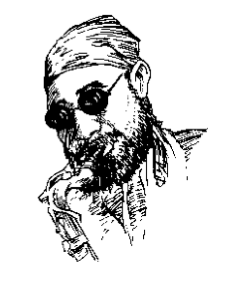David S. Ware could be the last of a vanishing breed—those imposing tenor giants who once bestrode (a la Sonny Rollins’s “Strode Rode” and namesake Woody Strode in Once Upon a Time in the West) the earth as saxophone colossi. He’s distilled the unreserved, pathfinding stratagems of Rollins, the mystic envelope-pushing of John Coltrane and Pharoah Sanders, the sputtering guttural rasp of Archie Shepp and the sensual one of early Gato Barbieri, into a pulsing wall of circular-breathing incantation. Ware’s enormous, keening tone and jaggedly breathtaking blocks of song and fury suggest an aural equivalent to Monument Valley rock formations—or a black John Wayne galloping through them with the obsessive, impassive swagger of a dinosaur on the trail of some equally primordial Tyrannosaurus Rex.
Ware’s dense, quavering lines and honking phrases loom over abstract harmonic landscapes like a force of mythological nature: an overblowing Minotaur or maybe a MIRV griffon (half warhead, half lion) performing a tumultuous reconciliation of intelligent design and chaos theory, roaring thoughtfully against the twilight. Which is a hyperbolic way of describing his romance with sound in its purest, most naked form. But the secret of his art (or at least a good chunk of it) has to do with the way he unrepentantly sculpts and finesses the hyperbolic qualities of free jazz itself, the over-the-top, out-of-their-heads, squall-and-scrawl qualities that can otherwise result in one interminable, unmodulated freak-out after another.
Thus “Acclimation” on Ware’s 1997 album Wisdom of Uncertainty opens with him sinking his chops into a wonderfully declamatory head, an R&B riff that’s been twisted into an almost classical shape, giving it a subtly misshapen grandeur. He proceeds to launch into a series of jolting yet deeply controlled variations on the theme, on the tenor saxophone’s timbre, and on what you might call the time-space discontinuum. Ware seems suspended inside a tight penumbra of dramatic effects—crashing nineteenth-century piano chords, sweeping drumrolls, low bass plunks—and manages to carve out a poised, meditative area inside all the commotion: a “Rapturelodic” tact and/or attack, to borrow the title of a lesser composition.
Pianist Matthew Shipp and bassist William Parker have been with him for about twenty years; only the drummers in his quartet have changed (my favorite has been Susie Ibarra, a pint-sized Cézanne of the skins). So there’s a tremendous sense of continuity, focus, and hard-won refinement to his music. Outside of a brief period in the ’70s as a sideman in Cecil Taylor’s unit (which can be instructively sampled on the clamorous, near-impenetrable Dark to Themselves) and a few scarce guest shots, he has devoted himself strictly to his own music. There’s an almost monastic ceremonial quality supporting his great...
You have reached your article limit
Sign up for a digital subscription and continue reading all new issues, plus our entire archives, for just $1.50/month.
Already a subscriber? Sign in





